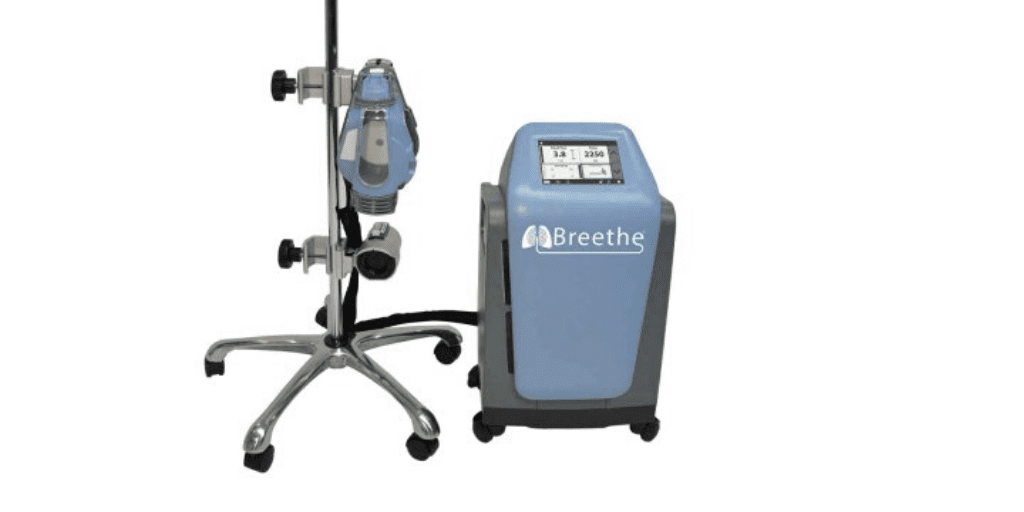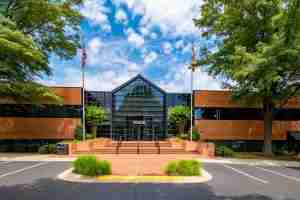
UMB Startup Breethe Acquired by Abiomed to Commercialize Wearable Artificial Lung System
The Deal Marks Another Successful Exit Supported by UM Ventures
May 26, 2020
Breethe, a company built on technology licensed out of the University of Maryland, Baltimore (UMB), was acquired by Abiomed, a publicly-traded medical device company located in Massachusetts, in late April 2020. Financials were not disclosed, but the deal represents another UMB success story that received early backing from the tech transfer program UM Ventures, which is a joint initiative launched out of UMB and the University of Maryland, College Park in 2012.
In 2015, Breethe obtained exclusive rights to UMB IP for the development of a portable extracorporeal membrane oxygenation (ECMO) device invented by Breethe’s Founder and well-known University of Maryland School of Medicine professor in pulmonary transplant surgery, Dr. Bartley Griffith. Dr. Griffith’s ECMO device is novel in that it is a portable, wearable, “out-of-hospital” artificial lung system that removes carbon dioxide and adds oxygen to a patient’s blood without the need to be hooked up to larger, bulkier, immobile equipment.
UMB invested in Breethe via UM Ventures, providing $100K of funding early in the company’s history. Breethe was one of UM Ventures’ first investments and marks the sixth UMB startup to exit in the last three years. Through UM Ventures, UMB invested in four of these companies, including Breethe, Harpoon, Living Pharma, and SurgiGyn.
“Breethe was able to stay in Baltimore County, they brought in a lot of local engineers and made tremendous progress over the past few years. They have a great partner in Abiomed who is positioned to fast track commercialization. Breethe’s ECMO device will be a very important product for them. It is great to see this vision — this dream that Dr. Griffith had for such a long time actually happen. We’re really happy for him personally, for the company, for the City of Baltimore, and for patients that could have a much better quality of life,” stated Phil Robilotto, Director of UM Ventures and Associate Vice President of Technology Transfer at UMB.
Breethe’s ECMO device could be a game changer for patients suffering from lung failure. It could provide an alternative to ventilators, allowing lung failure patients to remain ambulatory and able to go home during treatment, potentially improving outcomes and enhancing their capacity to keep living their lives.
Individuals that receive ECMO treatment generally have serious illnesses that stop their lungs from functioning properly. More than 20,000 patients receive ECMO treatment annually and, according to Breethe, approximately 235,000 people succumb to lung failure caused by a variety of ailments. When paired with Abiomed’s cardiogenic shock product, Impella, the world’s smallest heart pump, Abiomed’s ECPella (ECMO plus Impella) approach could transform the treatment of patients suffering from cardioshock that require oxygenation.
Breethe’s novel, mobile ECMO device is an important development for patients suffering from lung failure on its own. What’s more, Breethe’s ECMO offers a more intuitive user experience for the patient and healthcare providers, who will potentially manage the device in an at-home environment.
Dr. Griffith’s invention is an important development for patients suffering severe respiratory distress under normal circumstances, but it has now taken on even greater significance with the onset of the coronavirus pandemic. Breethe’s device is currently under review by the FDA for 501(K) pre-market approval as a Class II medical device. If approved, Abiomed plans to deploy Breethe’s ECMO device for a wide range of indications, including treating COVID-19 patients in severe respiratory distress.
“Breethe was one of UM Ventures’ first investments and the start of an impressive run of identifying and supporting promising life science technology and talent emerging from UMB. UM Ventures supports UMB companies with great technology, a strong management team and, ideally, with a renowned founder. The program focuses on seed round investments that can ignite funding and help a company get to point A,” stated Robilotto.
UM Ventures’ very first investment was in Harpoon Medical, a medical device company and one of the current anchors of Baltimore’s life science community. In 2017, Harpoon Medical was acquired by industry giant Edwards Lifesciences Corporation for $250M, which included a $100M cash payment and up to another $150M in milestone-driven payments.
When asked about why UM Ventures has been so successful in picking the right UMB technologies and talent, Robilotto replied, “We’ve made 11 investments in nine companies, including Harpoon. Our Venture Group team has a lot of hands-on experience in finance, investments, and executing deals. We also have a great group of external life science experts and advisors, and we only focus on life science opportunities. We are all life science people and all the technology we see is life science-related, so we’re able to focus on things we understand inherently. We have always focused on trying to be supportive and we really want to see UMB companies succeed.”
The pipeline of up-and-coming companies receiving early support from UM Ventures is far from tapped out. Five other UM Ventures-supported companies have big upside potential but have not yet exited: MedCura, NeoProgen, CoapTech, and NextStep Robotics, along with another medical device startup that has not yet been announced publicly.
In addition, GEn1E Lifesciences recently licensed a University of Maryland School of Pharmacy (SOP)-developed treatment for inflammatory and age-related diseases. Another SOP life science technology was recently licensed to Pumas-AI, a startup founded by SOP faculty members Dr. Vijay Ivaturi and Dr. Joga Gobburu. The UMB-created software technology is a cutting-edge clinical decision support system. Known as Pharmaceutical Modeling and Simulation (Pumas), “Pumas is a comprehensive platform based on the Julia programming language that contains multiple modules designed to meet the needs of analysts in the pharmaceutical industry, while also working to advance therapeutic innovation in the clinic setting,” according to UMB.
“All of these companies are making great progress and have continued to hit their milestones,” stated Robilotto. “Successes like Harpoon and Breethe are making people look at UMB as a place where not only is there a lot of great translational medicine and research being done, but also as a place that’s producing high-caliber startup companies as well.”
Abiomed’s recent acquisition of Breethe is another feather in UMB and UM Ventures’ cap and yet another sign that the University of Maryland, Baltimore is a vibrant and important BioHealth Capital Region translational science hub.
- About the Author
- Latest Posts
Steve brings nearly twenty years of experience in marketing and content creation to the WorkForce Genetics team. He loves writing engaging content and working with partners, companies, and individuals to share their unique stories and showcase their work. Steve holds a BA in English from Providence College and an MA in American Literature from Montclair State University. He lives in Frederick, Maryland with his wife, two sons, and the family dog.




